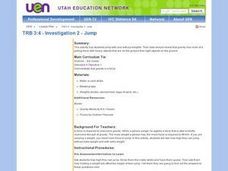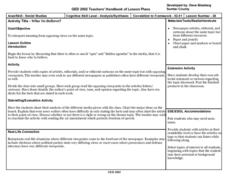Curated OER
Digging Deeper: Mission San Sabá
Seventh graders view a painting of the destruction of Mission San Saba in Texas. They discuss the painting and identify information that they can infer from the painting.
Curated OER
Wallpaper Pattern
Students identify, explain and use the basic elements of design. They find examples of the four different types of patterns by using wallpaper as their medium. They identify the four different types of pattern and find correct...
Curated OER
Basic Geometry Ideas and Angle Measurement
Seventh graders explore the concept of basic geometry. In this basic geometry lesson, 7th graders identify the correct picture for a given vocabulary word such as midpoint, line, ray, or parallel lines. Students discuss examples of...
Curated OER
Invention at Play Family Activities Guide
Pupils explore child psychology by participating in an interactive children's game. In this child relationship lesson plan, students identify playtime as the key ingredient to have a child become intellectually and creatively motivated...
Curated OER
Shape & Form
Students analyze the difference between shape and form. They identify, explain and use the basic elements of design and determine that forms are three-dimensional and shapes are two-dimensional. They sketch it on their paper and then...
Curated OER
"He Says, She Says"
Stuents compare and contrast male and female views of love and beauty in classic Chinese and Japanese society through the reading and evaluation of prose and poetry. Chinese and Japanese art is also studied.
Curated OER
Windows, Doors, Roofs, and Housing Styles
Young scholars identify window treatments and factors that lead to their selection. They study different types of windows and doors and a windows and doors project. They use their knowledge of styles to create an exterior drawing of a...
Curated OER
The Environment & Economy of SE Utah
Students compare and contrast the environment to the economy of Utah. In groups, they pick one environmental issue and identify its relationship to sustainable economic growth. To end the lesson, they share their findings with the...
Curated OER
Licensing Standards
Students examine standards for obtaining a license to run a day care. They study ratios for age groups and answer questions on improving public policy. They identify current childcare licensing standards and laws and what they could...
Curated OER
TRB 3:4 - Investigation 2 - Jump
Third graders jump with and without weights to reveal data that gravity has more of a pulling force with heavy objects that are on the ground than light objects on the ground. They also identify how their legs felt when they jumped with...
Utah Education Network (UEN)
Parenting Styles
Does your class know about different parenting styles and how each affects family dynamics or the children? This series of exercises invites consideration of the adult role of parenting. Everything you need for the lesson is included.
Curated OER
What do you know about your town?
Learners create a PowerPoint about the community they live in now and long ago. In this community lesson plan, students fill out graphic organizers about town events that have happened and create timelines as well.
Curated OER
Lesson 6: PowerPoint Presentation
Students design a PowerPoint presentation that expresses the adverse effects of smoking. In this PowerPoint and smoking lesson, students examine a student PowerPoint exemplar before creating one of their own following the given...
Curated OER
Digital Picture Water Source Hunt
Pupils use a technological format to illustrate their understanding of the importance of water to life. In this water lesson, students read a picture a book and discuss the need for water. Pupils create a class chart about uses of...
Curated OER
Students Solutions - Saving Our Surroundings
Young scholars explore the environmental impact of humans on the plants and animals in their state. In this environmental impact lesson, students use digital cameras to photograph plants and animals in their state. Young scholars...
Curated OER
Project H.O.P.E. (Highlighting Opportunities for Potential Employment)
Students explore career paths by creating a job scrapbook. In this employment lesson, students discuss what types of skills employers look for in the job market. Students decide on a career they would like to explore by...
Curated OER
Canada Geography PowerPoint
Students create a PowerPoint about Canadian geography or history. In this Canada lesson plan, students spend two days researching their Canadian topic in the library and online. They create a PowerPoint presentation and add pictures...
Curated OER
Persuasive Essay PowerPoints
Students address issues important to them by creating a PowerPoint presentation. In this persuasive writing lesson, students discuss issues with their classmates that they wish to address through a persuasive essay they will write....
Curated OER
Texas Industries Then and Now
Middle schoolers identify contemporary economic counterparts to industries featured in Texas bird's-eye views by using this website and a "Goods and Services Data Collection Sheet."
Curated OER
Unity Through Understanding
Students identify skills and attitudes that allow individuals to form functioning groups within the Canadian Parliament. The issues examined are applied to national unity concerns.
Curated OER
Thanksgiving Unit
Second graders identify: why the Pilgrims came to America; how they adjusted to life in America; what impact the Native Americans had on the survival of the Pilgrims; and what events brought about the First Thanksgiving.
Curated OER
Who To Believe?
Students interpret meaning from opposing views on the same topic, and discuss that there is often so much "spin" and "hidden agendas" in the media.
Curated OER
The Media
Learners explore political advertising. They discuss what informed voters should know about upcoming elections and identify the four main types of ads and view a video to identify the types of ads. Evaluating the ads, they identify...
Curated OER
Perception And The Interpretation of Experiences
Students describe a problem and propose alternative strategies for the solution. They use a model or drawing to visualize the solution to a problem. Students identify alternative factors to be considered when examining possible...

























